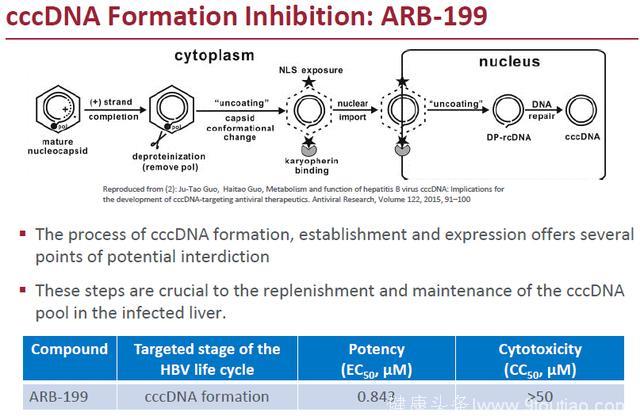我们还需要多久才能找到一个治愈乙肝的方法?据乙型肝炎基金会主席及该基金会联合创始人Timothy Block博士的认为:我们已经接近了。乙型肝炎基金会的合作研究同盟机构——巴鲁克布隆伯格研究所 (the Baruch S. Blumberg Institute)。Block 同时指出,丙型肝炎曾经也被认为是不可治愈的,然而今天却被用联合治疗方法给治愈了。

乙型肝炎基金会主席 Timothy Block
专家们相信,治愈乙肝的方法不需要多久就可以开发出来。并且治愈的代价也不会非常大,世界范围内有2.4亿的人慢乙肝感染者,而每年都有将近1百万人死于肝衰竭和肝癌等相关肝病。
“治疗手段是可能的,” Block 解释道,“但我们对目前批准用于治疗的药物治疗手段太没有自信。”虽然这些药物有一定效用,干扰素有很多不良反应且需要每日用药而且还需要终身使用。这些药物只在一部分感染人群中有效并且只能降低死亡率在40%到70%之间。
治愈手段看起来是怎样的?
目前可用的抗病毒药物都是相类似的,联合用药也没有任何优势。他们对于 cccDNA 的抗病毒作用相当有限,看似坚不可摧的乙肝病毒“微型染色体”在感染的肝细胞内持续不断的生产出新的病毒,即使是已经治疗或正在治疗的患者。而,一种治愈性的方法,则必须是能够破坏或沉默 cccDNA 并提供长期的免疫作用。因为单药治疗会导致耐药的发生,所以,想必治愈性方法应该是一种联合疗法,就跟现在治愈丙肝的方法那样。
Blumberg 的科学家在增加对乙肝病毒的生命循环了解和设计并开发新路径测试新药物上扮演着至关重要的角色。
“由于拥有我们德雷克塞尔大学的同事,我们在第一批,如果不是第一组,识别出了一种小分子能够抑制乙肝病毒cccDNA形成,”Block 指出。这是非常显著的,因为抑制cccDNA的形成被认为是在达到完全治愈乙肝当中是非常必须的。Block 相信达到这一目标的药物不久就会被开发出来。
在2015年,巴鲁克布隆伯格研究所将好几个他们的发明授权给了 Arbutus Biopharma(杨梅生物制药),而 Arbutus 是第一个专门致力于乙肝药物发现的公司,他们签订了三年的研究知情同意,共同开发新型治愈乙肝的方法路径。Block 解释道“这一独一的合作伙伴关系将允许我们将我们的研究发现更快速的从实验室转移至临床研究。”
对于他们的药物兵工厂,Blumberg 的研究人员已经使用电脑模型设计并生产出了靶向药物专门用于抗乙肝病毒和肝癌。在另外一个创新途径,研究人员正在从搜集的天然产物中筛查植物和真菌提取物,该项目由Merck & Co公司赞助。在2011年,已经发现了两种有抗乙肝病毒潜力的药物。
越来越接近最终终点
“此刻,治愈越来越临近,我们从未如此乐观,”Block 说道。“这是乙型肝炎基金会的目标,因此我们都非常兴奋。” Blumberg 的研究人员正在建立对治愈乙肝和肝癌有提高势头的最新发现:寻找有效药物的新筛查方法;使用不同方法降低乙肝病毒的新治疗途径;能加速早期检测出肝癌的新生血液标志物;在动物实验中有选择性杀死肝癌细胞的可靠药物。
“这些年我们把时间放在治愈乙肝研究中,我们已经奠定了最后阶段,”Block 说。“我们承诺,我们所拥有的一切,我们所掌握的一切资源,为了开发出最终能够改善全世界乙肝病毒感染者治疗的努力,终将载入乙肝治疗史的史册。”
目前 Blumberg 研究所正在开发的药物

cccDNA Inhibitors:Blumberg 是唯一一个识别出第一个小分子抑制剂抑制HBVcccDNA的团队,现在已经生产出高活性小分子抑制剂并授权给 Arbutus Biopharma 进行更深入的研究。
Capsid Inhibitors, “YES Kinase” Inhibitors:它是利用高通量筛选和电脑模型设计和生产出靶向药物,这些药物中包含针对乙肝病毒的衣壳抑制剂和针对肝癌的“YES激酶”抑制剂。
Immune System Activators:他们已经开发出一款新的针对乙肝病毒的药物,药物的作用原理为激活感染乙肝病毒的肝细胞的免疫系统,该效用已经在动物实验中获得有效性验证。
Natural Antiviral Agents:他们已经从搜集来的天然产物中筛查了成千种植物和真菌提取物,并识别出了两种有抗乙肝病毒潜力的药物。
推荐阅读:
Arbutus公布含 AB-423、ARB-1467 在内多个在研乙肝新药最新联合用药结果
EASL2016:Arbutus在研乙肝新药AB-423体内外表现良好
2016欧洲肝病学会年会学术专题
英文原文
Is a Cure for Hepatitis B Coming? Experts Say Yes
How far are we from finding a cure for hepatitis B? We are close, said Timothy Block, PhD, president and co-founder of the Hepatitis B Foundation and its research arm, the Baruch S. Blumberg Institute. He points out that hepatitis C, once thought to be incurable, is today cured with new combination treatments.
Experts believe a cure for hepatitis B will also soon be developed. And the need for a cure has never been greater, with more than 240 million people worldwide living with chronic hepatitis B, causing 1 million deaths per year from related liver failure and liver cancer.
“Treatments are available,” explained Block, “but we have become a little too comfortable with the medications that are currently approved for use.” While these drugs are effective, interferon has many side effects and daily antivirals require lifelong use. These drugs work in only half of the infected population and reduce death rates by only about 40 to 70 percent.
What will a cure look like?
The available antivirals are similar and combining them offers no advantage. They have limited effectiveness against cccDNA, the seemingly indestructible “mini-chromosome” of the hepatitis B virus that continues to produce virus particles in infected liver cells, even in people being treated. A cure, therefore, would have to destroy or silence cccDNA and provide long-term immunity. Because one-drug treatments can lead to drug resistance, a cure would almost certainly involve combination therapy, similar to hepatitis C.
With the recent advances in hepatitis B research, scientists are optimistic that another big leap in the search for a cure is possible if new complementary drugs are identified. The Baruch S. Blumberg Institute of the Hepatitis B Foundation is at the forefront of research efforts to discover such new drugs.
Blumberg scientists have played a key role in increasing understanding of the virus life cycle and are designing and developing ways to test new drugs.
“With our Drexel University colleagues, we are among the first, if not the only group, to identify a small molecule that inhibits hepatitis B virus cccDNA formation,” Block noted. This is significant because inhibition of cccDNA is considered essential in achieving a complete cure. Block is confident that a drug that can accomplish this will be developed.
In 2015, the Blumberg Institute licensed several of its discoveries to Arbutus Biopharma, the first company solely dedicated to hepatitis B drug discovery, and signed a three-year research agreement to work on novel approaches to developing a cure. “This unique partnership will allow us to move our discoveries more rapidly from the lab to the clinic,” Block explained.
Adding to its drug arsenal, Blumberg researchers have used computer modeling to design and produce targeted drugs against hepatitis B and liver cancer. In another innovative approach, researchers are screening plant and fungal extracts from its Natural Products Collection, donated by Merck & Co. in 2011, and have already discovered two potential drugs that are active against hepatitis B.
Getting close to the finish line
“There has never been more optimism than right now that a cure is within reach,” said Block. “This is the goal of the Hepatitis B Foundation, so we are all very excited.” Blumberg researchers are building on recent discoveries that have heightened the momentum around finding a cure for hepatitis B and liver cancer: new screening methods to search for effective drugs; new ways to treat hepatitis B using different approaches to shut down the virus; a new blood biomarker that aids in the early detection of liver cancer; and a promising drug that selectively kills liver cancer cells in animal studies.
“The years that we all have spent working towards a cure for hepatitis B have laid the groundwork for this final phase,” said Block. “We are committing everything we have, every resource at our disposal, to developing the therapies that will ultimately improve the lives of all people living with hepatitis B worldwide and ultimately relegate hepatitis B to the history books.”
Drugs currently in development at the Blumberg Institute
cccDNA Inhibitors: Blumberg is the only group to identify the first small molecule inhibitor of HBV cccDNA, which has now been made highly active and is licensed to Arbutus Biopharma for further development.
Capsid Inhibitors, “YES Kinase” Inhibitors: It is using high-throughput screens and computer modeling to design and produce targeted drugs that include capsid inhibitors for hepatitis B and “YES kinase” inhibitors for liver cancer.
Immune System Activators: It has developed a new HBV drug that works by activating an infected liver cell’s own immune system, which has been shown to be effective in animal studies.
Natural Antiviral Agents: It has screened thousands of plant and fungal extracts from our extensive Natural Products Collection and identified two new leads that show potential activity against HBV.












